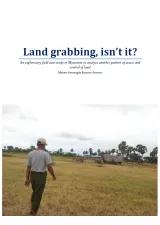Chinese agricultural investors and their impacts on rural households in Myanmar
After more than fifty years of socialist regime, Myanmar opened up their land market with the modifications to their Land Laws and Foreign Investment Law in 2011. Since then, large land concessions have increased dramatically.
These land concessions are undertaken with no consultation or compensation and are characterized by natural resource exploitation. In the uplands of Central Myanmar rural farmers who still rely on cattle to plough their lands and on rainfall to irrigate their fields, are pressured to decide between receiving a fixed income by renting their farmland to Chinese investors or, preventing their land from being used for unsustainable cultivation practices driven by these investors.
This study presents an analysis of the impacts that short-term land leases to Chinese agricultural investors has on farmers’ livelihoods in Chuang Kwa tract of Mandalay Region in Myanmar.
This research sought to understand: a) Chinese investor’s strategies to access farmers’ land, b) estimate effects on farmers’ income and food security c) implications on land-user rights and d) implications on land and water use.
This study follows the Institutional Analysis and Development (AID) Framework, applying a convergent methodology. Average effects of these land deals on total income and food security are estimated through the Propensity Score Matching (PSM); effects on household food diversity and food quality are explored through the Food Consumption Score (FCS) from the World Food Program.
Results indicate that farmers leasing land have increased their total income and have improved their food consumption. However, externalities such as soil impoverishment and groundwater depletion were recorded. Moreover although these land deals do not lead to formal land dispossession or people displacement, a dispossession of user rights was manifested.
Findings suggest that renting land may not bring significant improvements in the long-term. Farmers’ income increase might not continue and farmers’ food production might be under threat due to resource depletion. It is recommended that a legal agreement should be established between farmers and tenants to define the terms of land use, emphasizing sustainable land management.
- Thesis "Patterns of access to land by Chinese agricultural investors and their impacts on rural households in Mandalay Region, Myanmar”
- Discussion paper "Land grabbing, isn’t it?"
Product details
Table of contents
1. Introduction
2. Literature review
3. Conceptual framework
4. Methodology - data collection
5. Results
6. Discussion
7. Policy recommendations
8. Conclusion
